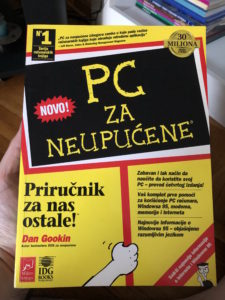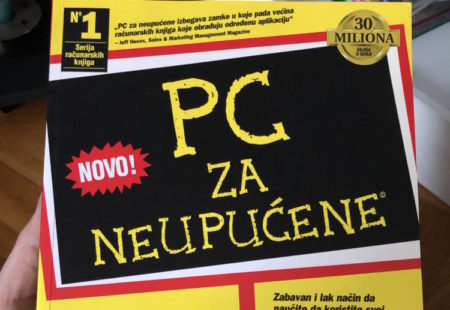By Petar Marinkovic, CTO, IOD
The longest summer break for me was the one between high school and university. At that point in life, we’re still too young and unaware to realize how great it is to have the entire summer to do what you want, or how stressful it will one day be to sit in an office from nine to five instead.
Luckily, I got a second chance at it.
Three years ago, I was slated to move to Germany for a new job, and since my visa process took some time, I ended up with a four-month “summer break.” I suddenly had an abundance of time to do stuff I hadn’t had time for in a while. One thing was to go through my huge IT book collection, which had grown quite a lot during the years.
In fact, at some point, my collection outgrew my bookshelves, and I had to store books in more than a dozen heavy boxes in the basement. Most of them were no longer even useful. (I mean who is going to read this one in 2015, right?) This task proved tedious, but also heartwarming, since it brought me down memory lane, as particular books marked the years I read them, and where I was in my “tech journey.”
How can those books still be so important to me? Well, Serbia didn’t have proper broadband in homes up until 2006-2007 (and then you could get ADSL with 128 or 256 Kbit/s download speed, at best.) Amazon didn’t deliver books to us until around the same time or even later. (And it still takes around 2-3 weeks to get a book from the US with standard shipping.) To get your hands on any IT professional-related books in English was pretty damn hard, and you know how quickly IT changes and how fast things are outdated in the world of tech. StackOverflow was only founded in 2008. So, for me, those books were previous.
At the end of sorting it, my collection turned out to be more than 250 books and training materials, I’ve donated most of them, almost all. But I’ve kept some special ones.
This blog post is dedicated to five of those special books, even though you cannot use them for anything seriously IT-related today. (Well, unless you need a monitor stand).
1. “PCs for Dummies”
Originally published in 1992, this book reached its 13th release a couple of years ago. I got mine in ‘97, even before I had my first PC, because my dad was a firm believer that you should study something carefully prior to using it. And he wasn’t that off target. From PCs for Dummies, I learned what a computer actually was. I had always thought, as many newbies back then, that the monitor was the main thing. I also learned what an operating system was and why it matters, how the Internet works, and some basics editing text, spreadsheets, and programming.
I devoured this book and reread it a few times more before I actually laid my hands on my first keyboard. In advance of writing this post, I re-read the table of contents of the most current version, plus one chapter on Windows 10, and I have to say this book is still a good starting point for anyone that doesn’t have a clue about how computers work, just like it was for me more than 20 years ago.
before I actually laid my hands on my first keyboard. In advance of writing this post, I re-read the table of contents of the most current version, plus one chapter on Windows 10, and I have to say this book is still a good starting point for anyone that doesn’t have a clue about how computers work, just like it was for me more than 20 years ago.
2. “Alan Simpson’s Windows 98 Bible”
On a special day in October 1998, my PC arrived. The technician who delivered it also connected all the cables for me. (I was too scared to do it on my own.) The PC started to boot and ta-da, the Windows 98 logo appeared.
Windows 98? My “dummies” bible didn’t mention that there was any OS other than Windows 95. Remember, this was before the Internet was widespread, especially in Eastern Europe. Plus, I was only 13 years old!
I started to use the PC right away anyway, but a lot of things were different on the screen than compared to what I had in “my book.” Eventually, after six months or so, I decided that if I wanted to master my machine — not just install games and play them 🙂 — I had to seek out additional knowledge. I began buying the Serbian edition of PCWorld magazine called Mikro and from it I found out that soon the translated version of Windows 98 Bible would arrive in Belgrade bookstores. Advertised as the book for understanding Windows 98 (and 1000 pages thick), the book cost more than $50, which was a lot for a kid from Serbia. It took me a couple of months to save money from my pocket allowance, but it was worth it.
Thanks to this book, I reinstalled my first OS, learned how to configure networking in Windows, change the registry (and kill your Windows in progress, happened to me a couple of times) and many more things under the hood. I would say that this book pushed me towards my career in IT, since I had a lot of fun while I was destroying and fixing my Windows on a monthly basis
3. “Beginning Java 2”
Fast forward to the beginning of my university days. It was autumn of 2004, and after successfully completing my qualification exams previous summer, it was high time for the “real IT stuff.” Besides a couple of math classes, one of the first IT-oriented classes was Introduction to Programming, and for that one, we, the students, were supposed to learn Java. The university provided for us with Beginning Java 2 by Ivor Horton which we quickly renamed “Horton’s Java” or just “Horton’s.”
For the next year and half or even more, this book was as close to me as my best friends. I had to learn a lot of Java in the first two years, and since there were no PluralSight or Safari Books available, and ordering books from abroad was practically impossible, Horton was “the man.” I wrote my first proper code thanks to this guy, and even though we later figured out there were other and probably better resources, most of us from my university felt close to Horton because he was actually the first guy to teach us proper software development. Nonetheless, his influence wasn’t enough to keep me in software development; I decided in my third year of my studies that I wanted to major in computer networks.
4. “Computer Networking: A Top-Down Approach Featuring the Internet”
If you want to configure networks, you have to speak TCP/IP fluently. At first, listening to a couple of lectures from my professors, I didn’t really understand the OSI layers and what all the fuss was about switching, routing, subnetting, and IP addressing. When the third year of university kicked off, I wondered if I had made the right choice. But, then our study materials for computer networking classes finally arrived, and I started to read this fantastic book, which is probably my favorite IT book of all time.
Kurose and Ross did an excellent job with this publication, and even if you get the version I read from 2004, you will still find it plenty accurate. If you’ve read this post carefully, though, you will remember that above, I wrote that you would not be able to use these books for anything today. And sadly, that’s still right, since this one fell apart when I cracked it open. And even though I tried to glue it together, it’s not in the best condition (or even close to it). But it’s still on my shelf, and whoever wants to touch it, will do so only under my supervision
5. “Petri.co.il”
For my fifth choice, I deliberately chose a website instead of a book. I started to work in 2006, while still at university, as a Windows administrator. The job wasn’t that glorious, and it had it own fair share of reinstalling Windows, unjamming printers, and adjusting Excel borders for non-IT colleagues. But, it was also the place where I first set up a Windows Active Directory domain from scratch with DNS, replaced a Cisco router, and deployed Windows RRAS to enable VPN and remote work. (People loved me for that). Lots of this I learned from the petri.co.il website, which still has an awesome forum and useful tutorials. Petri’s board is also important for my story because that’s the place I learned about Israeli tech and startup scene, and also where my love for blogs, discussion boards, and tech content began. IOD is an Israel-based company and so here I’ve come full circle!
Conclusion
At the end of that summer “break,” I donated more than 200 different IT books and training materials (through a Facebook public donation campaign.) These books aren’t the only ones I kept. There are another 20-30 that will stay in my collection for years to come, and my bookmark list is of course full with resources as useful as petri.co.il is. But, they don’t have the same sentimental value.
What are the books that have mattered in your IT professional career? Drop us a note, or even better, come join us and blog about yours.

